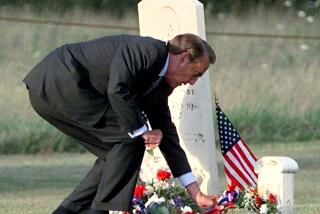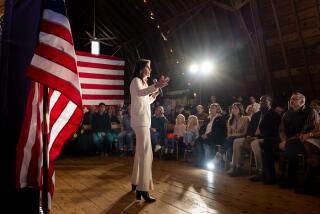Dole Must Find a Way to Cash In on Her Star Quality
- Share via
DETROIT — When Elizabeth Hanford Dole recently addressed the venerable Economic Club of Detroit, more than 2,000 people turned out, four times the usual crowd. Annette Duyck was among those packing the convention center, intrigued by the first serious White House run waged by a woman.
But like many, Duyck came out of curiosity, not commitment. “I’m happy to see her running,” she said. “But I don’t think [Dole’s election] is going to happen.”
In terms of her star quality, Dole’s luster remains undimmed to the large, doting crowds that flock to her appearances. The status of her candidacy, however, is another matter.
To vie for the party’s nomination in 2000, Dole will have to turn onlookers like Duyck into acolytes, convert her cachet into cash and attract tens of thousands of supporters who typically don’t vote in Republican primaries. So far, she’s fallen short.
“She has enormous as-yet-unrealized potential,” said pollster Whit Ayres, who is neutral in the GOP race. “Her task is to translate that potential into reality and translate her attractiveness into dollars.”
Dole’s slow start illustrates the difficulty of launching a presidential campaign from scratch, even for a candidate with certifiable star quality. Unlike Texas Gov. George W. Bush or other elected officials, Dole enjoyed no built-in political base beyond the goodwill established during her husband’s four tries at national office.
“I think there was some basic misunderstanding about what a steep task she had ahead of her,” said Nelson Warfield, a GOP strategist who served as spokesman for former Sen. Bob Dole’s 1996 presidential campaign. “I think that her team assumed that a lot more of the support for [her husband] would translate into support for Mrs. Dole.”
Weighing heavily on Dole’s candidacy, though, is persistent speculation that all she really wants is a shot at the No. 2 spot on the ticket--talk she swats away with scarcely concealed irritation.
“Look,” she told reporters in Detroit. “When you become involved in an arduous undertaking such as a presidential campaign, it is not to be vice president. You do it to win.”
Few candidates have generated the kind of enthusiasm that attended Dole’s January announcement that she was resigning as president of the American Red Cross to explore a White House bid. It also was an early high-water mark for her candidacy.
Dole’s initial campaign appearances were panned, as she rarely ventured beyond the most fail-safe platitudes. She also squandered political opportunities, failing to show for a prime speaking spot at the California Republican Party convention in February.
Most crucially, campaign contributions barely trickled in. For the first quarter of the year, Dole raised an anemic $618,000, which paled next to the $7.6 million raised by the front-running Bush.
“Her first quarter stunk,” said analyst Stuart Rothenberg, bluntly summing up the consensus among political experts. Tom Daffron, Dole’s campaign manager, acknowledges, “We have to do a lot of catch-up.”
The neophyte candidate has proved more successful at establishing a relatively centrist identity. That has placed her at odds with some of the positions her husband ran on.
Dole started her move to the middle on abortion, stating she would not push for a constitutional ban. In Detroit, Dole further split with many conservatives by calling for China’s entry into the World Trade Organization.
But her most dramatic gesture came Sunday night in strongly pro-gun New Hampshire, where Dole voiced support for the federal assault-weapon ban and called for other gun controls. In 1996, as the GOP nominee, Bob Dole took a hard line against most firearm restrictions.
“I’m going to share my views, then we’ll see who agrees and disagrees,” Elizabeth Dole said following her New Hampshire speech. “Obviously, you want to take into account everyone’s interests. But certainly I don’t think the party should be dominated by special interests.”
Even so, Dole continues to take a pick-and-choose approach to addressing issues. Asked in Detroit for details of her tax policy, for instance, she told reporters it was too early for specifics.
Indeed, renowned for her obsession with rehearsal and preparation, Dole still seems ill-suited for the spontaneous and sometimes weird mix-it-up of the campaign trail. “If she’s in Iowa and someone comes up and hands her a pig,” ventured political analyst Charles Cook, “does she kiss the pig?”
Said Warfield, “I guarantee if she reads about the possibility of a pig being presented to her, she’ll have a briefing paper on hogs the next day advising of the appropriate affectionate gesture.”
Given that innate caution, Dole’s centrist strategy represents a surprising gamble. By soft-pedaling social issues and provoking the GOP’s core conservatives, Dole clearly hopes to send a signal to voters turned off by the party’s intolerant image.
“She will speak with a different tone than people have heard in recent years,” said campaign spokesman Ari Fleischer. “It’s an inclusive message, a welcome message, a culturally tolerant message.”
It’s also risky. The most reliable GOP primary voters remain the most conservative, many aligned with the pro-gun and anti-abortion movements. To succeed, Dole will have to expand the ranks of GOP voters beyond traditional circles.
She could start by winning over potential supporters such as the curious but skeptical Duyck.
Although a Democrat, the 38-year-old legal assistant called Vice President Al Gore “a bore” and sniffed at former Sen. Bill Bradley, the vice president’s only competition. Might she change parties and back Dole, simply for history’s sake?
Duyck said nothing. But she smiled.
More to Read
Get the L.A. Times Politics newsletter
Deeply reported insights into legislation, politics and policy from Sacramento, Washington and beyond. In your inbox twice per week.
You may occasionally receive promotional content from the Los Angeles Times.











